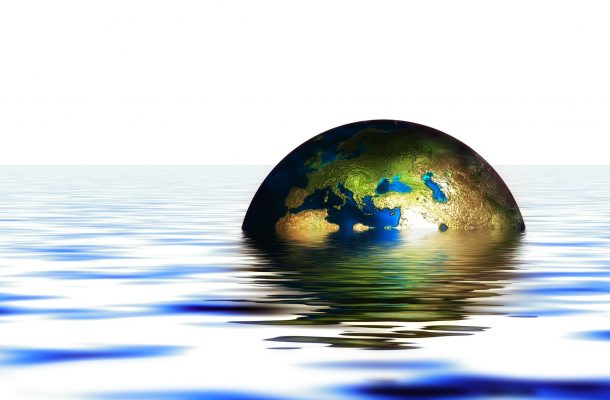Pacific report card highlights threats from climate change

The inaugural Pacific Marine Climate Change Report Card, released by the Commonwealth Marine Economies Programme and funded by the British government, charts the worrying effects which ocean acidification and global warming are having on fragile pacific ecosystems and the island nations which depend on them.
The Report Card was launched earlier this month at events in Fiji and Samoa to coincide with World Oceans Day. The report is the culmination of a 12 month project to synthesise the work of 60 Pacific climate change experts and marine scientists from the United Kingdom.
The report card headlines the findings of 13 detailed supporting reviews, laying out current data on the impact of climate change on the Pacific marine environment. It’s hoped the release of the data in an accessible and user friendly format will help Pacific islanders and regional decision-makers understand the gravity of the changes underway and take further steps to mitigate them.
Collaborators on the initiative include the British Centre for Environment, Fisheries and Aquaculture Science (Cefas) as well as the Secretariat for the Pacific Regional Environment Programme (SPREP), UN Environment, the University of the South Pacific, The Secretariat for the Pacific Community (SPC) and the Climate Analytics IMPACT project.
Launching the report, Mr Kosi Latu, the Director General of SPREP, said “We believe this report card will be valuable to our Pacific islands in helping to form policies and decisions at the national, regional and international levels.
“Being large ocean island states, our Pacific people are strongly interlinked with our ocean and as our Pacific islands live on the frontlines of climate change, we know all too well the impacts and risks it brings. This report card clearly outlines the risks and provides guidance for actions which can help make a difference.”
The study argues that rising sea levels, intensified storms, more frequent floods, higher temperatures, and ocean acidification will pose an ever greater threat to Pacific nations’ living space, housing and food and water security. In turn this will affect the culture, health and well-being of individuals and communities throughout the region.
Mr Sefanaia Nawadra, Head of the UN Environment Pacific Office underlined that “Climate change is a multifaceted issue so decision makers will appreciate a region specific report card that summarises its current status, recommends management options and through its supporting documents can provide scientific guidance for actions.
“This is exactly what the region needs to strengthen evidence based management, informed negotiations and sound decision making that builds climate change resilience.”
The report stresses the importance of urgent action and suggests a range of further measures to protect the Pacific and its inhabitants. In particular it emphasises the need to ease current pressures on the region’s ecosystem from pollution, marine waste, population growth, over-fishing and coastal development to increase its resilience to climate impacts.
It also calls for the incorporation of local knowledge in the region into adaptation planning, arguing that a better understanding of local climate impacts can be achieved by bringing scientists and affected communities together. Coastal planning and management should also become more flexible over time to meet the demands of future changes.
Derrick Armstrong, the Deputy Vice Chancellor of the University of the South Pacific welcomed the report card’s publication, noting it “provides an accessible, well-evidenced and comprehensive analysis of the effects of climate change on the Pacific Ocean and on the people who rely on it.
“This is very useful for the twelve member countries of The University of the South Pacific and underlies our ongoing University-wide commitment to oceans and climate change. Our role in the Report Card exemplifies the importance of progressive development of scientific capacity in citizens of our member countries in order to meet regional challenges.”
Dr Bryony Townhill, the lead co-ordinator of the Climate Change Report Card for the Caribbean and Climate Change Scientist at Cefas observed that “This report card builds on similar work we undertook in the Caribbean last year, which has helped to raise the profile of marine climate change issues at international climate change meetings.
“We hope that the Pacific report card can similarly help Pacific nations clearly understand the key risks of climate change, and how they can respond on a local and international scale.”
In addition to the 16 page report card, the supporting documents, authored by invited experts, explore themes of climate change and its effects on biodiversity, societies and economic activity.
These include studies on extreme events, ocean acidification and sea temperature changes, their effects on mangroves, corals, fish and shellfish and the impact this will have on fisheries, tourism, settlements and infrastructure. Other papers explore the effects of climate change on Pacific societies, cultures and gender relations.
Contributors were drawn from the Pacific marine science and policy community, while the working group responsible for the document contained regional experts from SPREP, USP, SPC, UN Environment, Climate Analytics. British contributors included researchers from the Centre for Environment, Fisheries and Aquaculture Science’s (Cefas) Marine Climate Change Centre (MC3).
Led by Britain’s Foreign and Commonwealth Office, the CME Programme is helping 17 Commonwealth Small Island Developing States (SIDS) in the Pacific and Caribbean to develop their marine economies in a sustainable, resilient and integrated way.
The CME programme promotes growth, innovation, jobs and investment whilst safeguarding healthy seas and ecosystems. In partnership with the SIDS, it will develop and implement further national Maritime Economy Plans to ensure a better future for communities affected by climate change.

Open Forum is a policy discussion website examining the social, political, economic, cultural and environmental issues of today. We welcome contributions and invite you to follow us on Twitter, Linkedin, Federated Press and Vivaldi Social. We #StandwithUkraine.












